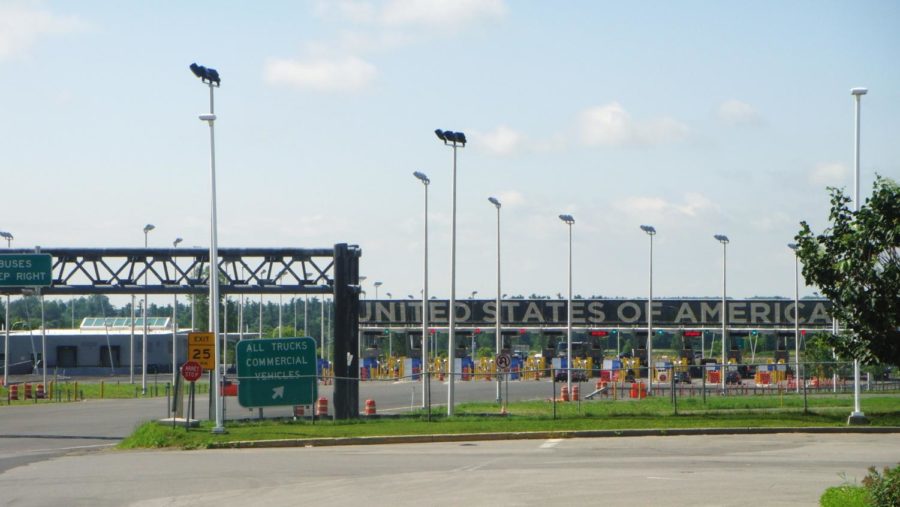US-Canada border to close to non-essential travel
The border between the United States and Canada at St. Bernard de Lacolle, P.Q. and Champlain, N.Y. The entire American-Canadian border is set to close to non-essential travel due to the COVID-19 pandemic.
March 19, 2020
The boundary between the United States and Canada, the longest undefended border in the world, will temporarily close to all but essential travel by the mutual consent of the American and Canadian governments due to the COVID-19 pandemic.
The border has never indefinitely closed in the modern history of the United States and Canada.
Canadian Prime Minister Justin Trudeau said in a press conference March 19 he expects the border the border measures to go into effect the night of March 20.
Kyle Estes, lecturer of political science, said there is little to be gained from closing the frontier because there is already ongoing spread of the disease within each country.
The New York Times has tracked the global pandemic with a map on its website, as of 10:30 a.m. March 19 there were 10,197 cases in the United States and 690 in Canada, according to the Times’ tracking.
“There may have been some ameliorative effect had all borders been closed weeks or months ago,” Estes said. “However, at that time the gravity of the situation was under-appreciated not only by U.S. federal government decision makers but by most governments globally.”
The Homeland Security Council developed an implementation in 2006 for an influenza pandemic. The plan said the nation’s ports of entry and transportation network are “critical elements” in the country’s preparation for and response to potential influenza pandemic, though it acknowledged actions at the borders would be unlikely to “prevent” the spread of a pandemic.
“Measures at our borders may provide an opportunity to slow the spread of a pandemic to and within the United States, but are unlikely to prevent it,” according to the plan. “Moreover, the sheer volume of traffic and the difficulty of developing screening protocols to detect an influenza-like illness pose significant challenges. While we will consider all options to limit the spread of a pandemic virus, we recognize complete border closure would be difficult to enforce, present foreign affairs complications, and have significant negative social and economic consequences.”
Border and transportation measures would be most effective in slowing the spread of a pandemic if they are part of a larger comprehensive strategy that incorporates other interventions including infection control measures such as “hand hygiene,” “cough etiquette,” social distancing, isolation, vaccination and treatment with antiviral medications, according to the plan.
“[B]est practices to slow the spread of such pandemics have long been well understood, and there seems to be a recognition that domestic measures will be more effective and practicable than maintaining complete border closures,” Estes said. “Closing the border with or prohibiting entry of goods and people from select countries not only has clear material costs but also psychological and diplomatic ones, as it can create a stigma around the singled out populations as particularly active transmitters of the virus, even when there is no such evidence.”
American and Canadian officials have tried to avoid impact to trade resulting from the border measures.
“We will be, by mutual consent, temporarily closing our Northern Border with Canada to non-essential traffic,” said President Donald Trump in a tweet March 18. “Trade will not be affected. Details to follow!”
Chrystia Freeland, the deputy prime minister of Canada, said in a news conference March 17 that the traffic across the border is “literally a lifeline” for Canadians and Americans on either side of it.
“We get our groceries thanks to truckers who drive back and forth across that border,” Freeland said in the news conference. “Very urgently-needed medical supplies and medicines go back-and-forth across that border.”
In the fall 2019 semester, there were 39 Canadian students enrolled at Iowa State, according to the university fact book.
President Wendy Wintersteen announced in an email March 18 all classes at Iowa State would remain online for the remainder of the spring 2020 semester and the Department of Residence would begin restricting the ability to live in residence halls beginning March 22, with exceptions available for international students who cannot return home or for those who returning home would represent a health or safety risk for them or those at home.







